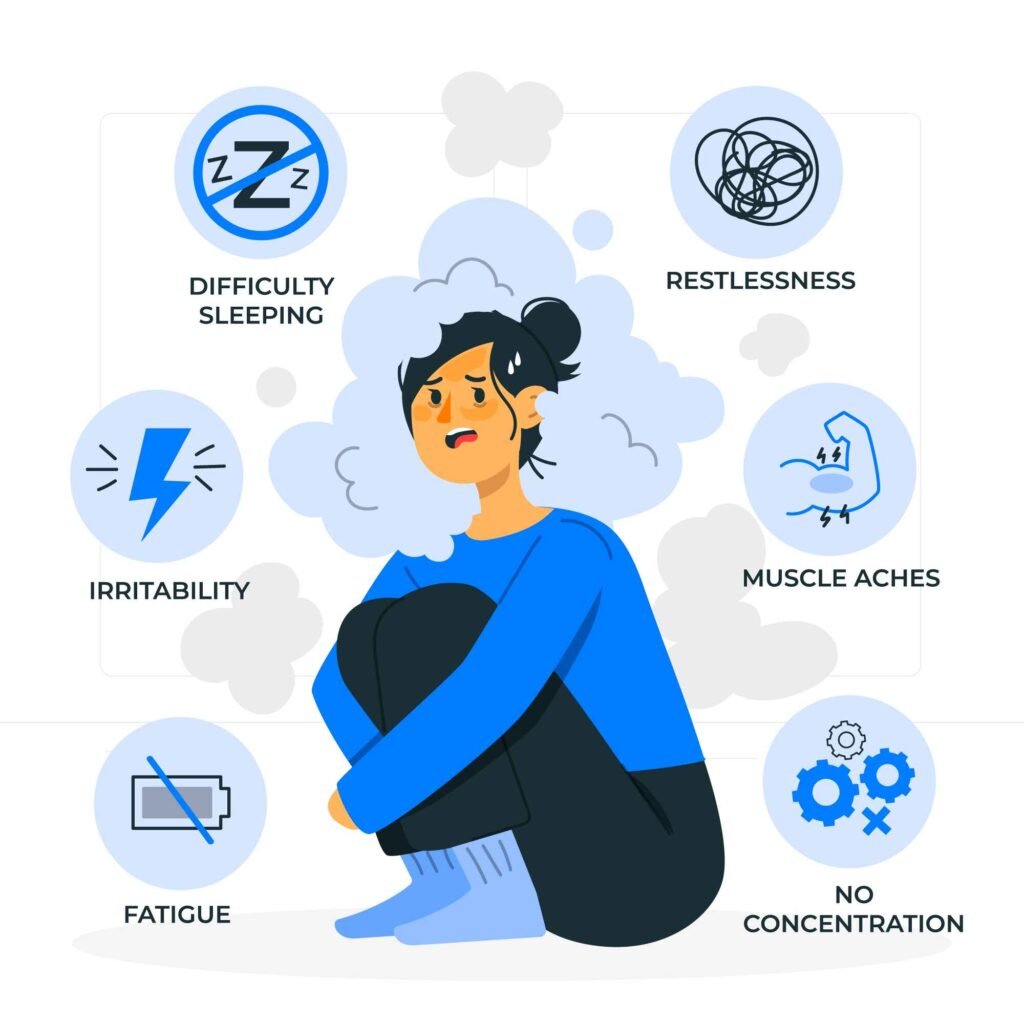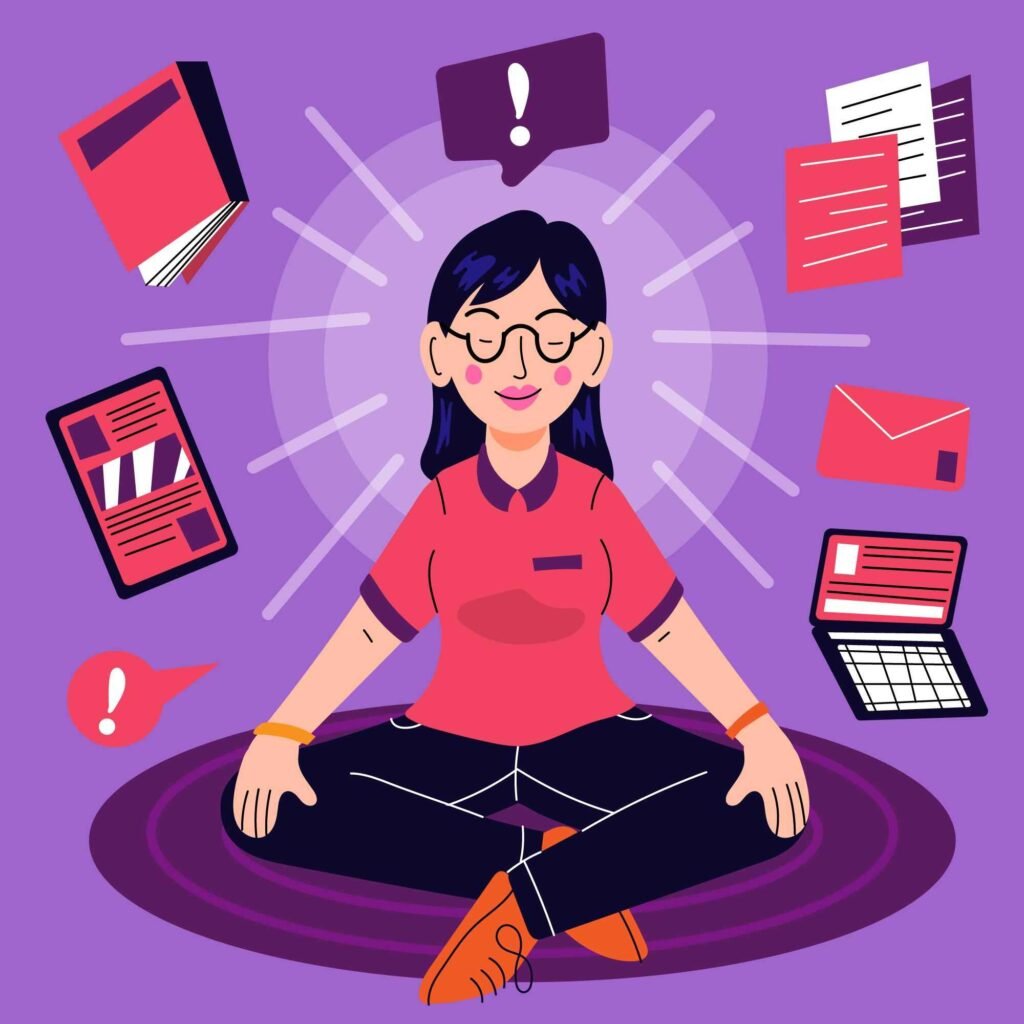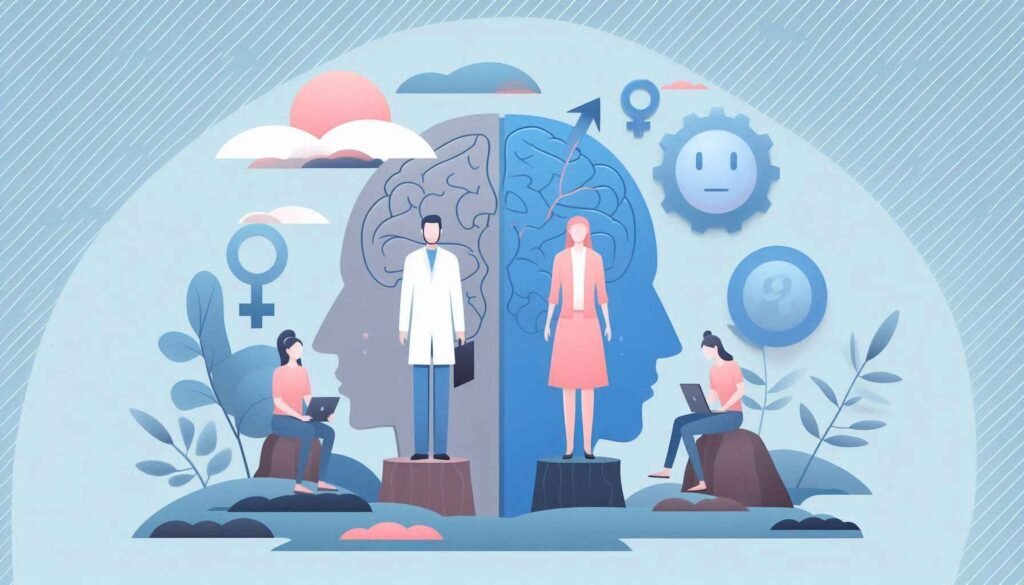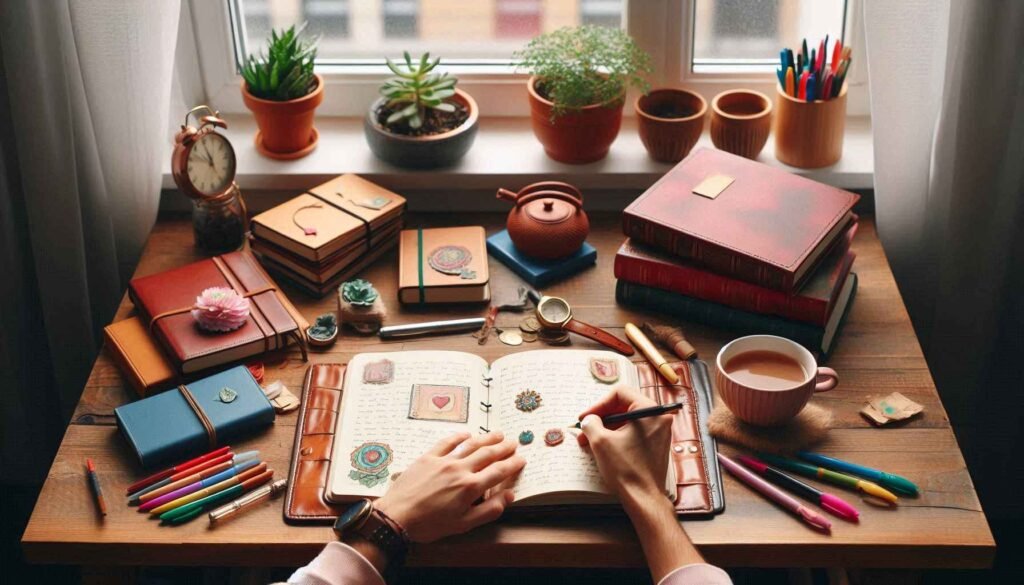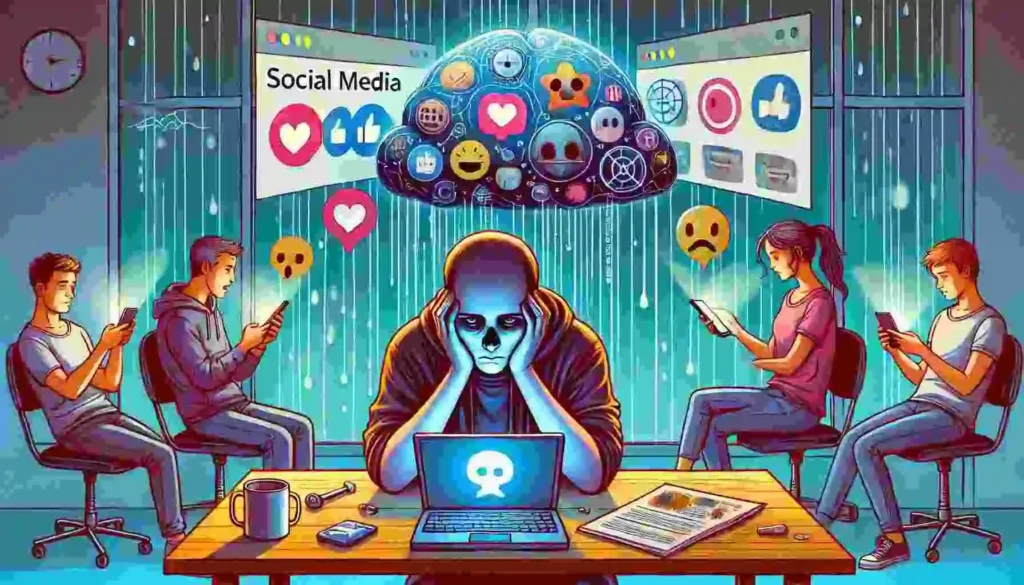
Impact of Social Media on Mental Health
Introduction: The Double-Edged Sword of Social Media
Social media platforms have revolutionized the way we connect, communicate, and consume information. With platforms like Instagram, Facebook, Twitter, and TikTok, staying connected to friends and family is easier than ever. Yet, beneath the surface of likes, shares, and comments, lies a darker reality. The impact of social media on mental health, particularly concerning anxiety and depression, has become an increasing concern for psychologists, parents, and users alike.
While social media offers benefits such as connectivity, inspiration, and community support, its excessive or unhealthy use can contribute to feelings of inadequacy, anxiety, and loneliness. Understanding how social media affects mental health is the first step to managing its negative consequences and finding a healthier balance.
The Hidden Link Between Social Media and Mental Health
1. The Dopamine Loop: Addiction by Design
Social media platforms are designed to keep users engaged for as long as possible. The addictive nature of these platforms can be attributed to the brain’s reward system, particularly the release of dopamine – the “feel-good” chemical.
- Likes, Comments, and Shares: Every like or comment acts as a mini-reward, reinforcing the urge to post more content and stay active.
- Instant Gratification: The quick feedback loop of social media creates a sense of immediate satisfaction, making it hard to put the phone down.
- The Fear of Missing Out (FOMO): Seeing others enjoy experiences can trigger anxiety about missing out on life events or opportunities, increasing feelings of inadequacy.
These elements contribute to social media addiction, which can lead to anxiety, poor sleep, and reduced real-life social interactions.
2. Anxiety and Social Comparison: The Highlight Reel Trap
One of the most harmful effects of social media is the tendency to compare oneself to others. Social media often represents a highlight reel rather than reality. People post their best moments, creating an illusion of a perfect life.
- Filtered Perfection: Platforms like Instagram are filled with highly curated and edited images that set unrealistic standards for beauty, success, and lifestyle.
- Pressure to Perform: Seeing others achieve milestones can create a sense of pressure to keep up, leading to performance anxiety.
- Negative Self-Talk: Constant comparison can trigger thoughts of inadequacy, decreasing self-esteem and increasing anxiety.
Studies have shown that higher levels of social comparison on social media correlate with increased symptoms of anxiety and depression.
3. Loneliness in a Connected World
Ironically, while social media is designed to enhance connection, excessive use can lead to increased feelings of loneliness.
- Superficial Connections: Online interactions often lack the depth of real-world relationships, leading to a feeling of emotional emptiness.
- Isolation from Real Life: Spending hours on social media can reduce face-to-face interactions, leading to social isolation.
- Digital Fatigue: Continuous scrolling and engagement can lead to mental exhaustion, further amplifying feelings of loneliness.
A study by the American Journal of Preventive Medicine found that people who spent more than two hours a day on social media were twice as likely to feel socially isolated compared to those who used it for less than 30 minutes.
How Social Media Contributes to Depression
1. Unrealistic Expectations and the Impact on Self-Worth
Social media can distort our perception of reality, leading to unrealistic expectations for ourselves.
- Body Image Issues: Exposure to idealized body types can lead to body dissatisfaction, especially among teenagers and young adults.
- Achievement Anxiety: Comparing personal achievements to others’ curated successes can create a sense of failure and hopelessness.
- Lifestyle Envy: Seeing influencers or peers traveling, dining, and enjoying luxury can spark feelings of envy and disappointment in one’s own life.
Over time, these negative feelings can deepen into chronic sadness and depression.
2. Cyberbullying and Harassment
Unlike traditional forms of bullying, cyberbullying can follow victims everywhere, creating a persistent sense of dread and fear.
- Anonymous Threats: The anonymity of social media can embolden bullies to harass others without facing real-world consequences.
- Public Shaming: Negative comments and public shaming can damage self-esteem and trigger depressive episodes.
- Relentless Exposure: Victims of cyberbullying may feel like they can never escape, leading to withdrawal, sadness, and thoughts of self-harm.
A 2020 study found that victims of cyberbullying are more likely to experience clinical depression than those who are not.
3. Sleep Disruption and Mood Disorders
The habit of scrolling through social media before bed can negatively impact sleep quality.
- Blue Light Exposure: The blue light emitted by screens interferes with the production of melatonin, making it harder to fall asleep.
- Overstimulation: Engaging with content before bed can lead to mental overstimulation and anxious thoughts.
- Sleep Deprivation: Poor sleep is directly linked to mood disorders, including depression and anxiety.
Signs That Social Media Is Affecting Your Mental Health
It’s important to recognize the warning signs that social media may be negatively impacting your mental health:
- Increased Anxiety: Feeling nervous or worried after using social media.
- Low Self-Esteem: Regularly feeling inadequate or dissatisfied with yourself.
- Mood Swings: Experiencing irritability, sadness, or anger linked to social media interactions.
- Poor Sleep Patterns: Difficulty falling asleep or staying asleep due to late-night scrolling.
- Social Withdrawal: Reducing face-to-face interactions in favor of online engagement.
- Obsessive Checking: Compulsively checking notifications and feeling anxious when disconnected.
Managing Social Media Use for Better Mental Health
1. Set Time Limits
Use app features or digital wellbeing tools to limit daily social media usage. Aim for less than 2 hours per day to reduce negative mental health impacts.
2. Curate Your Feed
Follow accounts that inspire and uplift you, and unfollow or mute accounts that trigger anxiety or comparison.
3. Schedule Social Media Detoxes
Take regular breaks from social media to reset your mental wellbeing. Try weekly or monthly detoxes to regain balance. Managing Social Media Use for Better Mental Health (Continued)
4. Prioritize Real-Life Connections
Social media should complement, not replace, real-world interactions. Prioritizing face-to-face connections helps foster deeper relationships and reduces feelings of isolation.
- Plan In-Person Activities: Schedule regular outings with friends or family.
- Engage in Group Hobbies: Join clubs, sports teams, or local community events.
- Practice Active Listening: During in-person conversations, put away your phone to stay fully present.
Strong personal connections can mitigate the negative effects of social media on mental health.
5. Use Social Media Mindfully
Mindful social media use means being intentional about why and how you use these platforms. This approach reduces impulsive scrolling and enhances the quality of your online experience.
- Ask Yourself ‘Why’: Before logging in, ask yourself why you’re opening the app. Is it to connect, learn, or out of habit?
- Avoid Mindless Scrolling: If you catch yourself endlessly scrolling, take a break.
- Set Boundaries: Designate specific times of day for checking social media rather than doing it continuously.
Mindfulness can transform social media from a stressor into a tool for connection and growth.
6. Engage in Positive Online Communities
Not all social media interactions are negative. Engaging with supportive and uplifting communities can have positive effects on mental health.
- Join Support Groups: There are many online groups for mental health support, hobbies, fitness, and personal development.
- Follow Inspirational Accounts: Curate your feed with accounts that motivate, educate, or uplift you.
- Share Positively: Use your own profile to share uplifting content, achievements, or things that inspire you.
Positive interactions can foster a sense of belonging and reduce feelings of anxiety.
The Role of Digital Wellbeing Tools
To combat the negative impacts of social media, many apps and devices now offer digital wellbeing tools. These tools can help you monitor and limit your social media usage effectively.
1. Screen Time Trackers
Most smartphones have built-in screen time trackers that help you:
- Set Daily Limits: Limit time spent on specific apps.
- Receive Usage Reports: Get weekly summaries of your screen time to identify patterns.
- Schedule Downtime: Block social media access during specific times, like bedtime or work hours.
Examples include Apple’s Screen Time, Android’s Digital Wellbeing, and third-party apps like Moment and RescueTime.
2. Focus and Productivity Apps
Productivity apps can help you stay focused and reduce distractions caused by social media.
- Pomodoro Technique Apps: Tools like Forest and Focus Booster use timers to encourage focused work sessions with breaks in between.
- Website Blockers: Apps like Freedom and StayFocusd block distracting websites and social media during set hours.
Using these tools can reduce procrastination and improve mental clarity.
3. Notification Management
Notifications are a major source of anxiety and distraction. Managing them effectively can improve mental wellbeing.
- Disable Non-Essential Notifications: Turn off notifications for apps that don’t require immediate attention.
- Use ‘Do Not Disturb’ Mode: Schedule times when notifications are silenced, such as during work or sleep.
- Customize Alerts: Only allow notifications from important contacts or apps that genuinely enhance your day.
Reducing notification overload helps lower anxiety levels and enhances focus.
Building a Healthy Relationship with Social Media
1. Practice Digital Detoxes
Taking periodic breaks from social media can reset your mental health and offer a fresh perspective.
- Weekly Breaks: Try taking a full day off from social media each week (e.g., ‘Screen-Free Sunday’).
- Monthly Challenges: Participate in month-long detox challenges to fully recharge.
- Vacation Detox: When traveling or during holidays, limit social media use to enjoy the present moment.
A digital detox can reduce anxiety and improve overall happiness.
2. Develop Offline Hobbies
Balancing social media use with offline activities is key to maintaining mental health.
- Explore Creative Outlets: Engage in activities like drawing, writing, cooking, or photography.
- Get Active: Exercise, practice yoga, or go for nature walks to boost endorphins and reduce stress.
- Learn New Skills: Take up a new hobby like playing an instrument, learning a language, or gardening.
These hobbies offer a productive and fulfilling break from screens.
3. Create Tech-Free Zones
Designate areas in your home where social media and screens are off-limits.
- Bedroom: Keep your bedroom a tech-free zone to improve sleep quality.
- Dining Area: Ban phones during meals to encourage meaningful conversations.
- Workspaces: Reduce distractions by keeping phones away from your desk.
Tech-free zones promote mindfulness and healthier routines.
Expert Insights on Social Media and Mental Health
1. Insights from Psychologists
Experts agree that while moderate social media use can be beneficial, excessive use poses mental health risks.
- Dr. Jean Twenge, a psychologist, notes that the rise in anxiety and depression among teens coincides with increased smartphone use.
- Dr. Sherry Turkle emphasizes the importance of face-to-face interaction, stating that digital communication often lacks emotional depth.
2. Research Findings
Several studies highlight the link between social media and mental health:
- University of Pennsylvania Study (2018): Reduced social media use to 30 minutes a day led to significant reductions in anxiety, depression, and loneliness.
- Royal Society for Public Health (RSPH): Found that platforms like Instagram negatively impact body image and self-esteem, especially among young people.
Recognizing When to Seek Help
If social media is significantly affecting your mental health, it may be time to seek professional support.
Signs You May Need Help
- Persistent Anxiety: Constant worry or fear related to social media interactions.
- Depressive Symptoms: Feelings of hopelessness, sadness, or low energy.
- Social Withdrawal: Avoiding real-life interactions in favor of online engagement.
- Sleep Issues: Chronic sleep problems due to nighttime scrolling.
Where to Find Support
- Therapists and Counselors: Many mental health professionals specialize in digital addiction and anxiety management.
- Online Therapy Platforms: Services like BetterHelp and Talkspace offer flexible online counseling.
- Support Groups: Join groups that focus on social media addiction or anxiety management.
Seeking help can provide coping strategies and support for a healthier relationship with social media. Building Long-Term Healthy Habits for Social Media Use
Creating a sustainable, long-term approach to social media use is key to protecting your mental health. Instead of relying on short-term fixes, cultivate habits that promote a healthier relationship with your digital life.
1. Develop a Balanced Digital Lifestyle
Just like physical health requires a balanced diet and regular exercise, digital health requires balance too.
- Set Clear Boundaries: Decide on non-negotiable rules for your social media use. For example, no social media before 9 AM or after 9 PM.
- Mix Online and Offline Activities: For every hour spent on social media, dedicate at least one hour to an offline activity, such as reading, exercising, or spending time with loved ones.
- Practice Moderation: Avoid extremes. You don’t have to quit social media entirely—moderate use is often the healthiest option.
By establishing balance, you can enjoy the positive aspects of social media without falling into harmful patterns.
2. Schedule Regular Reflection Times
Take time weekly or monthly to reflect on your social media habits. Ask yourself:
- How does social media make me feel?
- Am I using it for connection or as a distraction?
- What changes can I make to feel better?
Journaling your thoughts can help you identify patterns and make adjustments to improve your digital wellbeing.
3. Create a Morning Routine Without Social Media
Starting your day without social media can set a positive tone for the entire day.
- Practice Mindfulness: Begin with meditation, deep breathing, or a gratitude exercise.
- Physical Activity: Engage in a morning walk, yoga, or exercise session to boost endorphins.
- Goal Setting: Write down your top three tasks for the day before reaching for your phone.
These practices help you focus on yourself first, rather than being influenced by what others are doing.
The Role of Parents and Educators in Managing Social Media Use
1. Setting Boundaries for Children and Teens
Young people are particularly vulnerable to the negative effects of social media. Parents and educators can play a critical role in setting healthy boundaries.
- Age-Appropriate Access: Delay social media use until children are emotionally ready, typically around 13 years old.
- Screen Time Limits: Set daily or weekly screen time limits and use parental controls to enforce them.
- Bedtime Curfews: No social media or screens an hour before bedtime to ensure healthy sleep habits.
2. Open Communication
Foster an open dialogue about social media use with children and teens.
- Discuss Risks: Talk about cyberbullying, social comparison, and privacy concerns.
- Encourage Critical Thinking: Help them recognize that not everything they see online is real or healthy.
- Check In Regularly: Ask how social media makes them feel and offer support when needed.
3. Leading by Example
Children learn by observing adults. Model healthy social media habits:
- Put the Phone Away: During family time, meals, and conversations, avoid scrolling.
- Balance Online and Offline Life: Show that real-life interactions are more important than digital ones.
- Take Breaks Together: Participate in social media detoxes as a family.
Success Stories: Real-Life Examples of Positive Change
Hearing how others have transformed their social media habits can be inspiring. Here are a few success stories of individuals who improved their mental health by managing social media use.
1. Sarah’s Story: From Anxiety to Balance
Sarah, a 28-year-old marketing professional, used to spend 6-7 hours a day on social media. Constant comparisons and work-related pressure led to severe anxiety.
- Her Solution: Sarah implemented a social media schedule—30 minutes in the morning and 30 minutes in the evening. She also began a morning routine that included journaling and exercise.
- Result: Her anxiety levels dropped significantly, and she felt more in control of her time and emotions.
2. Mike’s Story: Digital Detox for Mental Clarity
Mike, a 35-year-old entrepreneur, realized his productivity and mental clarity were suffering due to endless scrolling.
- His Solution: He took a 30-day social media detox and replaced the time with reading and outdoor activities.
- Result: Mike felt a renewed sense of focus and reduced stress. He now uses social media intentionally, limiting his daily use to 45 minutes.
3. Emma’s Story: A Teen’s Journey to Self-Esteem
Emma, a 16-year-old high school student, struggled with body image issues due to social media.
- Her Solution: With her parents’ help, she curated her feed to follow body-positive influencers and muted accounts that made her feel inadequate.
- Result: Emma’s self-esteem improved, and she felt empowered to take breaks from social media whenever needed.
Practical Tips for a Healthier Social Media Experience
1. Follow the 80/20 Rule
Use social media 80% for positive, productive, and uplifting purposes, and only 20% for entertainment or mindless scrolling.
2. Practice the ‘One-In-One-Out’ Rule
For every new account you follow, unfollow one that no longer serves you. This keeps your feed fresh and positive.
3. Avoid Multitasking
When you’re on social media, be fully present. Avoid using it while doing other activities, like eating or working. This prevents overstimulation and anxiety.
4. Celebrate Offline Wins
Acknowledge and celebrate achievements in real life, not just on social media. This reinforces the importance of offline experiences.
The Future of Social Media and Mental Health
1. Platform Responsibility
Social media platforms are beginning to recognize their role in mental health. Features like:
- Time Limit Reminders: Apps now offer reminders to take breaks.
- Hidden Likes: Some platforms allow users to hide likes to reduce social comparison.
- Mental Health Resources: Direct access to mental health support within apps.
These changes are a step forward, but continued pressure on tech companies is needed for lasting improvements.
2. Evolving User Awareness
As awareness of social media’s mental health impact grows, more users are adopting healthier habits. Trends like digital minimalism and mindful tech use are becoming more popular.
